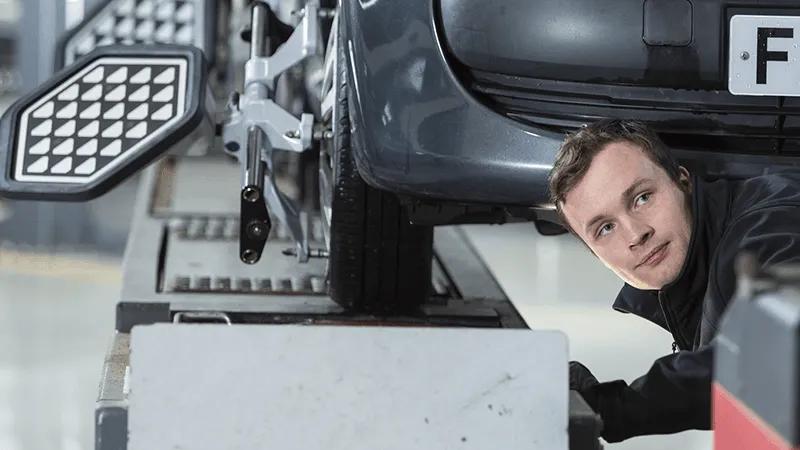
Book a brake fluid top-up
Low or contaminated brake fluid can lead to reduced braking performance and make you take longer to stop. To help make sure your car is stopping safely, get your brake fluid checked and topped up.

Book a diagnostic
A mechanic will check your car for faults and talk you through any repairs you might need. There are various ways to check for faults, which could include a physical examination or plugging in to check your car’s onboard engine management system.
Content Guide
Introduction
Ever wonder what makes your car stop so fast? It’s all thanks to brake fluid. But like any other part of your vehicle, it needs regular care to keep you safe on the road. In this article, we’ll explain why changing your brake fluid is crucial and cover everything you need to know.
What is brake fluid?
Brake fluid is the liquid that helps your car stop when you press the brake pedal. It transfers the force needed to slow down or stop, even under high heat and pressure. This fluid plays a key role in keeping you safe on the road. Different types of brake fluids, like DOT 3, DOT 4, DOT 5, and DOT 5.1, each have their own unique properties and boiling points.
Types of brake fluids
- DOT 3: Glycol-based fluid with a lower boiling point, suitable for standard vehicles.
- DOT 4: Glycol-based fluid with higher boiling points, often used in higher performance vehicles.
- DOT 5: Silicone-based fluid, non-hygroscopic (doesn't absorb water), used in military and classic vehicles.
- DOT 5.1: Glycol-based with a high boiling point, suitable for high-performance and heavy-duty vehicles.
How often should I change my brake fluid?
You should change your brake fluid every two to three years or every 30,000 miles, whichever comes first. Check your car's manual though for the exact timing, as it can vary. Regular changes keep your brakes working their best, help prevent problems down the road, and most importantly, keep you safe.
What affects brake fluid change intervals
- Driving conditions: Frequent braking, as seen in city driving, can degrade brake fluid faster.
- Vehicle type: High-performance and heavy-duty vehicles may require more frequent changes.
- Manufacturer’s guidelines: Always follow the specific recommendations for your vehicle.
Symptoms of a brake fluid leak
- Soft or spongy brake pedal: There’s air in the brake lines or there’s slow brake fluid levels.
- Brake warning light: Can signal low brake fluid or other brake system problems.
- Visible fluid leaks: Puddles under your car or around brake components.
- Poor braking performance: Longer braking distance or the brakes feel less effective.
Detailed Symptoms
- Soft brake pedal: If your brake pedal feels squishy or spongy, it usually means there’s air or moisture in the brake lines, often due to a leak or low fluid. This can weaken your braking power.
- Brake warning light: Modern cars have sensors that light up when brake fluid is low. If you see this light, check your brake fluid right away. It could point to a serious issue.
- Visible fluid leaks: Look for clear or brownish fluid puddles near your wheels or under the brake pedal. These leaks are a sign of a major problem that needs fixing fast.
- Poor braking performance: If your car takes longer to stop or the brakes feel weak, your brake fluid might be old, contaminated, or leaking. This reduces your stopping power.
Brake fluid change cost
The cost of changing brake fluid varies depending on several factors, including the type of vehicle, the type of brake fluid used, and labour costs. On average, you can expect to pay between £140 and £180. It's essential to get a specific quote from your mechanic to understand the full cost and what’s included in the service.
Regularly changing your brake fluid is crucial for maintaining the efficiency and safety of your vehicle's braking system. Fresh brake fluid ensures that your brakes respond correctly, providing the stopping power needed to drive safely. Always consult with a professional mechanic to get the best advice and service tailored to your vehicle.
Frequently Asked Questions on brake fluid change
Yes, you definitely need to change the brake fluid! Over time, it absorbs moisture, which lowers its boiling point and weakens its performance. This can cause your brakes to fade, work less effectively, or even fail.
If you don’t change your brake fluid, you’re putting yourself in danger – it’s as simple as that. Over time, brake fluid absorbs moisture, lowering its boiling point which makes your brakes less effective. Old brake fluid can also cause corrosion in the brake system, leading to costly repairs.
You can, but it needs the right tools and know-how. It's usually safer and better to let a mechanic handle it to make sure it’s done right.
Change your brake fluid every two to three years or every 30,000 miles. Check your car’s manual for exact timing.
No, mixing is a bad idea. Old fluid may have moisture and dirt, which can weaken the new fluid. Always replace all the old fluid to keep your brakes working their best.
A brake fluid flush is when all the old fluid is drained out and replaced with new fluid. This removes moisture and dirt from the brake system, helping it work safely and efficiently.


